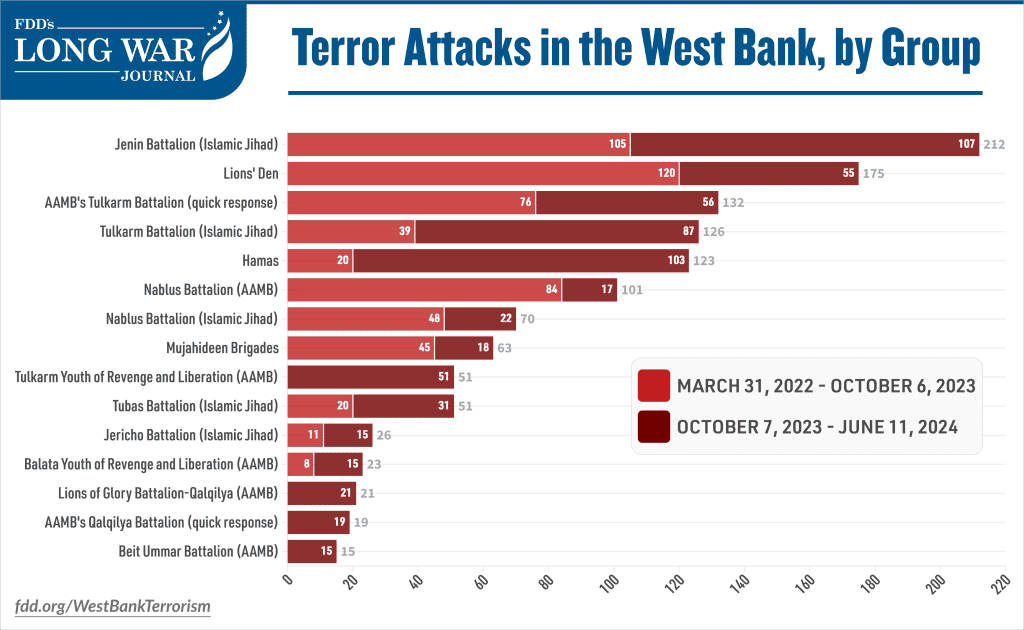
For three years, violence in the West Bank has persisted with no signs of abatement, fueled mainly by Iran-backed terrorist groups. While Israeli forces conduct near-daily counterterrorism raids, attacks on Israeli Defense Forces (IDF) and civilian targets continue. Branches belonging to Islamic Jihad, the Al Aqsa Martyrs’ Brigades, Hamas, and other armed groups not only continue to be operational but are expanding their presence in the West Bank.
The FDD’s Long War Journal “Mapping Terrorism in the West Bank” project breaks down attacks carried out by armed groups between March 31, 2022, and June 13, 2024. Additionally, the project breaks down data to show attacks pre- and post-October 7, 2023.
Notable figures from the tally reveal that Katibat Jenin, the Islamic Jihad’s Jenin branch, has been responsible for the majority of attacks against Israeli targets. The Lions’ Den has also conducted a significant number of attacks. However, that group has since ceased its activities following repeated Israeli counterterrorism raids against its leadership and members. The Al-Aqsa Martyrs’ Brigades’ Tulkarm Battalion has also demonstrated a capacity to launch a substantial number of attacks, with a total of 132 recorded incidents.
Separately, LWJ’s mapped data highlight a concerning issue regarding the presence of numerous terrorist groups operating in the West Bank. While the infographic identifies 15 groups, many linked to known terrorist organizations, additional factions are also active. The data illustrate a marked rise in the number of armed cells, indicating a substantial uptick in terrorist activity in comparison to previous years when only a few militant groups were active in the West Bank.
A significant development the infographic does not highlight is the substantial increase in the use of improvised explosive devices (IEDs) against Israeli troops. Initially, Palestinian terrorist groups in the West Bank relied on automatic weapons, pipe bombs, and crudely rigged fire extinguishers. However, as the violence in the West Bank evolved, armed groups have grown in capability. For example, IED manufacturing labs have been established, creating more sophisticated and powerful explosives capable of causing significant damage to thinly armored Israeli military vehicles.
Two notable examples of this trend are attacks in January and May of this year. On January 7, an Israel Border Police officer succumbed to injuries sustained in a roadside bomb explosion, which was claimed by Islamic Jihad’s Jenin branch. On May 5, a car bomb detonated against an Israeli bulldozer, with Islamic Jihad’s Tubas branch taking responsibility for the attack.
These incidents demonstrate the evolving tactics of Palestinian terrorist groups and the growing sophistication of their explosive devices.
Iran is arming West Bank terrorist groups
Iran has been advocating for arming Palestinian terrorist groups in the West Bank since 2014. In August 2022, Islamic Revolutionary Guard Corps (IRGC) Quds Force Chief Hossein Salami stated that the West Bank was “being armed” against Israel. He repeated the claim less than a year later, hinting that the Iranian regime was involved in the surge of West Bank violence.
“But invisible hands have armed the West Bank, and you [now] see modern automatic rifles and automatic weapons in the hands of the Palestinians,” said Salami.
Salami’s words were not mere rhetoric. A significant indicator that the status quo had changed in the West Bank was that armed groups increasingly clashed with Israeli troops, and shooting attacks against IDF posts and Jewish communities became prevalent.
Iran’s strategy to arm Palestinian terrorist groups involved employing its proxies and networks of clients in the region to smuggle arms to the West Bank. In September 2023, a senior Israeli military official confirmed to LWJ that Lebanese Hezbollah was involved in the plot.
Moreover, on March 25, the Shin Bet said it had thwarted an Iranian plot to smuggle advanced weapons into the West Bank. The smuggling network involved two units from the Islamic Revolutionary Guard Corps and a senior Fatah official in Lebanon.
The Iranian regime has demonstrated a shrewd ability to identify areas of weak governance in the region and leverage its proxies to exploit them. One such example is the Palestinian Authority in the West Bank, which has a troubled history of corruption and declining popularity. Recognizing an opportunity, Iran initiated a substantial campaign to arm and support its existing proxies in the West Bank, creating a new “resistance” front on Israel’s doorstep.
This development has presented a serious security challenge, as armed Palestinian groups supported by Iran continue to pose a threat despite three years of perpetual Israeli efforts to mitigate it.







